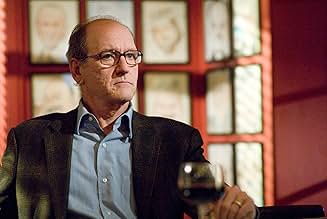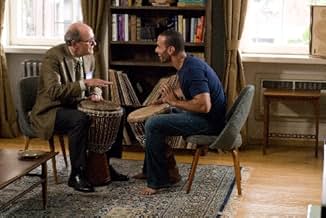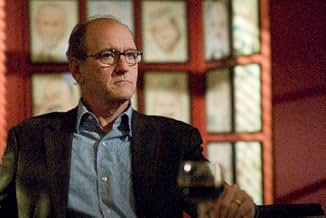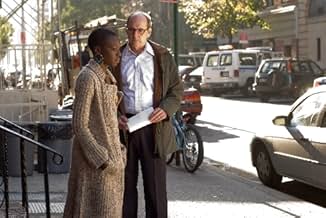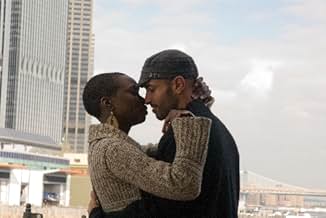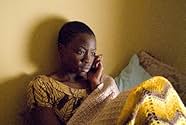AVALIAÇÃO DA IMDb
7,6/10
46 mil
SUA AVALIAÇÃO
Um professor universitário viaja para a cidade de Nova York para participar de uma conferência e encontra um jovem casal morando em seu apartamento.Um professor universitário viaja para a cidade de Nova York para participar de uma conferência e encontra um jovem casal morando em seu apartamento.Um professor universitário viaja para a cidade de Nova York para participar de uma conferência e encontra um jovem casal morando em seu apartamento.
- Indicado a 1 Oscar
- 19 vitórias e 35 indicações no total
Avaliações em destaque
Mr. McCarthy's film seems to be working at several levels, a main one being the character development of Walter Vale, and another the effects of blind bureaucracy upon the human spirit.
It was interesting to see Vale's callous attitude toward one of his students early on when the lad was late turning in a class paper. The student's reason: some serious personal issues. Did the professor show any extra understanding or compassion for the young man? No; the paper was late and therefore simply unacceptable.
Yet when Vale wanted information and understanding later on at the immigration department when making inquiry about the deportation of Tarek Kahlel, what did he do but blatantly rant about how insensitive and unimpassioned was the system. This, after he'd previously witnessed a similar situation at the front desk with another frustrated inquirer.
What's the country to do, having immigration regulations in place: excuse and make special exceptions for certain illegal aliens? As Vale showed no interest in learning about his student's situation, he yet expected the immigration department to bend to his personal demands.
Vale was certainly a pathetic prof, drifting through life without energy or passion. His encounter with Tarek and his wife and mother all seemed rather arbitrary, allowing these relationships to become his interest, for lack of a better direction. Personally, I felt sorry for this glum character, yet mindful that the death of a spouse can cause some derailment in direction.
The cast was uniformly fine, with special kudos to Richard Jenkins and Haaz Sleiman.
It was interesting to see Vale's callous attitude toward one of his students early on when the lad was late turning in a class paper. The student's reason: some serious personal issues. Did the professor show any extra understanding or compassion for the young man? No; the paper was late and therefore simply unacceptable.
Yet when Vale wanted information and understanding later on at the immigration department when making inquiry about the deportation of Tarek Kahlel, what did he do but blatantly rant about how insensitive and unimpassioned was the system. This, after he'd previously witnessed a similar situation at the front desk with another frustrated inquirer.
What's the country to do, having immigration regulations in place: excuse and make special exceptions for certain illegal aliens? As Vale showed no interest in learning about his student's situation, he yet expected the immigration department to bend to his personal demands.
Vale was certainly a pathetic prof, drifting through life without energy or passion. His encounter with Tarek and his wife and mother all seemed rather arbitrary, allowing these relationships to become his interest, for lack of a better direction. Personally, I felt sorry for this glum character, yet mindful that the death of a spouse can cause some derailment in direction.
The cast was uniformly fine, with special kudos to Richard Jenkins and Haaz Sleiman.
Thomas McCarthy's 2nd film after the wonderful "Station Agent" is equally good, if not better. I can't recommend Richard Jenkins' performance any higher here. He plays a widowed professor who is drifting through life rather aimlessly until he visits his New York apartment and finds there are two people squatting there. I won't give away anything else, except to say that it'll be a shame if this film flies under the radar. Jenkins is a character actor that everyone recognizes, but that few of us know. Here he occupies the first third of the film practically alone, and reminds us in moments of the Jack Nicholson character from "About Schmidt" with his dry humor that is on display for his crabby piano teacher.
Don't you just love watching an actor up there alone who keeps you spellbound in a subtle way? That's how this movie starts, and gradually we come to meet the couple in Jenkins' apartment, and the mother of one of them. The movie flows economically and with much care, but by the end it creeps up on us and makes us feel glad along the way as well as making us pause and reflect on the state of our world.
Lovely, lovely movie.
Don't you just love watching an actor up there alone who keeps you spellbound in a subtle way? That's how this movie starts, and gradually we come to meet the couple in Jenkins' apartment, and the mother of one of them. The movie flows economically and with much care, but by the end it creeps up on us and makes us feel glad along the way as well as making us pause and reflect on the state of our world.
Lovely, lovely movie.
Richard Jenkins' portrayal of lacklustre professor Walter is beautifully underplayed, somnambulistically acting out the various roles of his life as a stilted economics professor. The beginning scenes unravel artfully and launch into the story where Walter is abruptly introduced to the young couple (Tarek and Zainab).
The ensuing impromptu friendship that develops is well conceived. The wariness and strong-will of Zainab contrasts well against her boyfriend Tarek's more forthright relaxed nature. The interplay between Tarek, Zainab and Walter is at times awkward, at times touching. I felt that these quality performances go a long way towards forgiving the unlikely set of circumstances (and responses) that brought and kept the three characters together.
I thought the scenes where Walter learns to play the djembe were beautifully played; Walter's awkward but curious initiation to drumming and the (unexpected) expression of pure joy on his face while playing added believable depth to an otherwise restrained and austere performance.
Walter's exposure to the djembe perhaps underpins the films well-intentioned message that our lives are enriched by living side-by side with other cultures. Good intentions aside, I think the second half of the film suffers because of the filmmaker's heavy-handed desire to go further and promote the idea that 'good people suffer in the hands of US immigration control'.
In my opinion producing a film with any agenda is problematic because it requires a degree of rationalisation and simplification which works against interesting characterisation. Life is very rarely straightforward and when it is straightforward, it isn't interesting to watch.
In the case of the second half of The Visitor, I felt that this overarching requirement to show the characters in a positive light removed any sense of conflict the characters might have otherwise possessed. The story no longer had a life of it's own and seemed to involve reaching a predetermined conclusion through any route possible.
The character of Tarek's (caring / strong / dignified) mother, fell short of the high-expectations that I'd built-up during the first half of the film. I felt her portrayal was lacking and I didn't fully understand the function her character played. The subsequent relationship that develops between Walter and Mouna seemed gratuitous and left too many questions unanswered.
After watching this and Tom McCarthy's first film (The Station Agent), it's clear to me that McCarthy is an accomplished director / writer - who perhaps excels at directing character-based stories. I think this film suffers because halfway through the film McCarthy attempts to move focus from a rich exploration of character, to a slightly ill-conceived issue-based drama.
Nevertheless, I thoroughly enjoyed The Visitor.
The ensuing impromptu friendship that develops is well conceived. The wariness and strong-will of Zainab contrasts well against her boyfriend Tarek's more forthright relaxed nature. The interplay between Tarek, Zainab and Walter is at times awkward, at times touching. I felt that these quality performances go a long way towards forgiving the unlikely set of circumstances (and responses) that brought and kept the three characters together.
I thought the scenes where Walter learns to play the djembe were beautifully played; Walter's awkward but curious initiation to drumming and the (unexpected) expression of pure joy on his face while playing added believable depth to an otherwise restrained and austere performance.
Walter's exposure to the djembe perhaps underpins the films well-intentioned message that our lives are enriched by living side-by side with other cultures. Good intentions aside, I think the second half of the film suffers because of the filmmaker's heavy-handed desire to go further and promote the idea that 'good people suffer in the hands of US immigration control'.
In my opinion producing a film with any agenda is problematic because it requires a degree of rationalisation and simplification which works against interesting characterisation. Life is very rarely straightforward and when it is straightforward, it isn't interesting to watch.
In the case of the second half of The Visitor, I felt that this overarching requirement to show the characters in a positive light removed any sense of conflict the characters might have otherwise possessed. The story no longer had a life of it's own and seemed to involve reaching a predetermined conclusion through any route possible.
The character of Tarek's (caring / strong / dignified) mother, fell short of the high-expectations that I'd built-up during the first half of the film. I felt her portrayal was lacking and I didn't fully understand the function her character played. The subsequent relationship that develops between Walter and Mouna seemed gratuitous and left too many questions unanswered.
After watching this and Tom McCarthy's first film (The Station Agent), it's clear to me that McCarthy is an accomplished director / writer - who perhaps excels at directing character-based stories. I think this film suffers because halfway through the film McCarthy attempts to move focus from a rich exploration of character, to a slightly ill-conceived issue-based drama.
Nevertheless, I thoroughly enjoyed The Visitor.
The Visitor strings together unlikely events in the lives of a professor and his visitors. Remarkably sincere and touching, the unimaginable events feel natural.
Awkward Connecticut economics professor Walter Vale (Richard Jenkins) has essentially checked out from his job, his personality and his life. Walter is forced by circumstance to return to his abandoned New York City apartment. When he returns he meets Tarek (Haaz Sleiman) and Zainab (Danai Jekesai Gurira), who have taken up unauthorized residence in his apartment. Tarek and Zainab teach Walter to live again, to come out of his shell and remind him how unfair life can be.
Writer and director Thomas McCarthy wrote all of the characters in The Visitor with almost contradictory personality attributes which gives them each a complex humanity.
McCarthy wrote Walter Vale painfully dull and bumbling but it was Richard Jenkins who also makes Walter charming and heart breaking. In nearly every setting, Jenkins both makes the audience scrunch their faces at Walter's social inadequacies while simultaneously bringing out our Florence Nightingale instincts. As Walter changes in the course The Visitor, Jenkins keeps the essential qualities of Walter but changes him in surprising ways.
The supporting cast isn't any less remarkable in The Visitor. There is a master of life, a vision of unabashed sadness and an embodiment of sensual motherly warmth. Haaz Sleiman, who plays Tarek, is (damn foxy) full of life as Tarek. His esprit fills Tarek, the audience, the other characters and actors with such vitality. Danai Jekesai Guria plays Zainab, Tarek's girlfriend. So much of Zainab is forlorn despondent dejection. Rich with beautiful hardness and unnaturally attractive pain, Danai Jekesai Guria made Zainab so hard to watch but impossible to pull your eyes away from. Hiam Abbass plays Mouna, Tarek's mother. Her fear is palpable but she never loses her intangible sensuality.
The most remarkable part of The Visitor is the way it organically shows the way life can change un-expectantly, unfairly and without warning and does it with real, raw emotion. Just when you think you've figured out what the movie is about, you slapped with a new reality. It is frightening, timely and angering. Even the ending, which is not the typical movie ending, is emotive in a subtle and realistic way. I was not overwhelmed or underwhelmed by the movie, I was perfectly whelmed; a task indeed.
The pacing is the one complaint I have with The Visitor. The editing could have been much better. There are beautiful scenes sometimes drawn out to boredom. Scenes that were the actors' timing is slightly off are only highlighted by the shoddy editing. The Visitor is an artsy movie but Tom McArdle checked out completely in a few of the scenes.
Slow bits aside, The Visitor is a rewarding film with rich characters, beautiful acting and complexities that might make those people who are quick to tears, cry.
Awkward Connecticut economics professor Walter Vale (Richard Jenkins) has essentially checked out from his job, his personality and his life. Walter is forced by circumstance to return to his abandoned New York City apartment. When he returns he meets Tarek (Haaz Sleiman) and Zainab (Danai Jekesai Gurira), who have taken up unauthorized residence in his apartment. Tarek and Zainab teach Walter to live again, to come out of his shell and remind him how unfair life can be.
Writer and director Thomas McCarthy wrote all of the characters in The Visitor with almost contradictory personality attributes which gives them each a complex humanity.
McCarthy wrote Walter Vale painfully dull and bumbling but it was Richard Jenkins who also makes Walter charming and heart breaking. In nearly every setting, Jenkins both makes the audience scrunch their faces at Walter's social inadequacies while simultaneously bringing out our Florence Nightingale instincts. As Walter changes in the course The Visitor, Jenkins keeps the essential qualities of Walter but changes him in surprising ways.
The supporting cast isn't any less remarkable in The Visitor. There is a master of life, a vision of unabashed sadness and an embodiment of sensual motherly warmth. Haaz Sleiman, who plays Tarek, is (damn foxy) full of life as Tarek. His esprit fills Tarek, the audience, the other characters and actors with such vitality. Danai Jekesai Guria plays Zainab, Tarek's girlfriend. So much of Zainab is forlorn despondent dejection. Rich with beautiful hardness and unnaturally attractive pain, Danai Jekesai Guria made Zainab so hard to watch but impossible to pull your eyes away from. Hiam Abbass plays Mouna, Tarek's mother. Her fear is palpable but she never loses her intangible sensuality.
The most remarkable part of The Visitor is the way it organically shows the way life can change un-expectantly, unfairly and without warning and does it with real, raw emotion. Just when you think you've figured out what the movie is about, you slapped with a new reality. It is frightening, timely and angering. Even the ending, which is not the typical movie ending, is emotive in a subtle and realistic way. I was not overwhelmed or underwhelmed by the movie, I was perfectly whelmed; a task indeed.
The pacing is the one complaint I have with The Visitor. The editing could have been much better. There are beautiful scenes sometimes drawn out to boredom. Scenes that were the actors' timing is slightly off are only highlighted by the shoddy editing. The Visitor is an artsy movie but Tom McArdle checked out completely in a few of the scenes.
Slow bits aside, The Visitor is a rewarding film with rich characters, beautiful acting and complexities that might make those people who are quick to tears, cry.
It's only about twice a decade that I run across a movie that really impresses me. It's usually an obscure film that I entered with no expectations -- but left blown away by its cinematic achievement.
I just saw such a film tonight. "The Visitor" A small independent production with zero-advertising. Made by Tom McCarthy whose prior film, "The Station Agent," was an imperfect, character-absorbed drama.
The star of this movie is an actor (Richard Jenkins) whom you'll recognize from his numerous roles as minor-characters, most notably the dead-patriarch in "Six Feet Under." All of the other actors are completely unknown, but notably talented.
The appeal of this film is its story. An aged, listless academic, whose wife died earlier, floats through his uninteresting life until something happens to jar him. What happens next is unexpected, interesting and poignant. It would ruin the story if I told it to you, so you'll have to trust me. Suffice it to say it's a story of rebirth.
Like most of my favorite films, it has comedy, pathos, surprises, authenticity and a philosophical examination of what it means to be human. In short, everything, even politics.
And the presentation is skillfully-crafted. McCarthy demonstrates what was good about his prior work without dragging it down with what was bad about that work.
See it.
I just saw such a film tonight. "The Visitor" A small independent production with zero-advertising. Made by Tom McCarthy whose prior film, "The Station Agent," was an imperfect, character-absorbed drama.
The star of this movie is an actor (Richard Jenkins) whom you'll recognize from his numerous roles as minor-characters, most notably the dead-patriarch in "Six Feet Under." All of the other actors are completely unknown, but notably talented.
The appeal of this film is its story. An aged, listless academic, whose wife died earlier, floats through his uninteresting life until something happens to jar him. What happens next is unexpected, interesting and poignant. It would ruin the story if I told it to you, so you'll have to trust me. Suffice it to say it's a story of rebirth.
Like most of my favorite films, it has comedy, pathos, surprises, authenticity and a philosophical examination of what it means to be human. In short, everything, even politics.
And the presentation is skillfully-crafted. McCarthy demonstrates what was good about his prior work without dragging it down with what was bad about that work.
See it.
Você sabia?
- CuriosidadesFor O Visitante (2007), Tom McCarthy won the 2008 Independent Spirit Award for Best Director, while Richard Jenkins was nominated for Best Actor at the 81st Academy Awards®.
- Erros de gravaçãoIn New York airport, the flight was announced as "flight to Syria", although it should actually name the airport (Damascus), not the country. But more importantly, there is no direct non-stop flight from New York to Syria.
- Citações
Prof. Walter Vale: We are not helpless children!
- Cenas durante ou pós-créditosBaldwin's L2 grand piano
Principais escolhas
Faça login para avaliar e ver a lista de recomendações personalizadas
Detalhes
- Data de lançamento
- País de origem
- Idiomas
- Também conhecido como
- The Visitor
- Locações de filme
- Empresas de produção
- Consulte mais créditos da empresa na IMDbPro
Bilheteria
- Orçamento
- US$ 4.000.000 (estimativa)
- Faturamento bruto nos EUA e Canadá
- US$ 9.443.451
- Fim de semana de estreia nos EUA e Canadá
- US$ 86.488
- 13 de abr. de 2008
- Faturamento bruto mundial
- US$ 18.213.880
- Tempo de duração
- 1 h 44 min(104 min)
- Cor
- Mixagem de som
- Proporção
- 1.85 : 1
Contribua para esta página
Sugerir uma alteração ou adicionar conteúdo ausente


